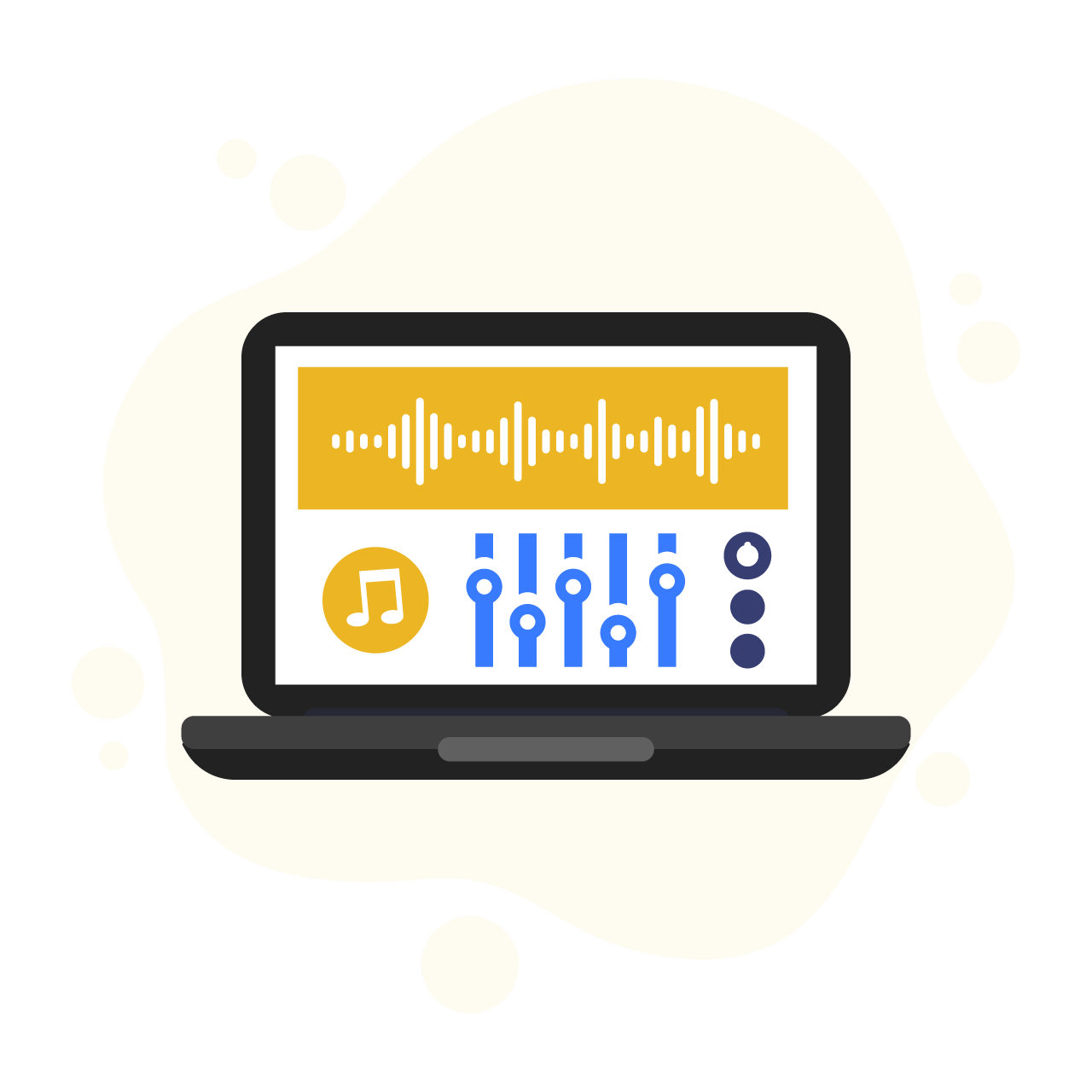Table of Contents
A quick look at the rosy podcasting statistics probably got you excited to start your journey as soon as possible. But as with any new opportunity or venture, there’s often a “shoulder devil” whispering tall tales and planting doubts in your head.
We dug into Google to uncover some common search queries and better understand people’s reservations and the reasons they might second guess the idea of taking a plunge into business podcasting – and here’s a snapshot of what online users ask:
- Is starting a podcast a good idea?
- Is making a podcast worth it?
- Why you should not start a podcast
- Is it a bad idea to start a podcast?
- What are the cons of podcasting?
- Does podcasting have a future?
First, it’s okay to ask such questions; it’s okay to conduct some due diligence before diving headfirst into podcasting.
But there’s a difference between mitigating risk and excessively stressing about things not working out in your favor—especially when you’ve been misled by half-truths and whole lies. For this reason, this post will focus on debunking podcasting myths to sort facts from fiction.
Spoiler Alert: Most of the things that scare you about podcasting are nothing more than myths.
Aspiring to start a B2B podcast? Worried that you don’t have what it takes to succeed? Start by busting the following podcasting myths from your head.
Debunking Podcast Myths.
Myth #1 – You don’t Have What it Takes to Start a Podcast.
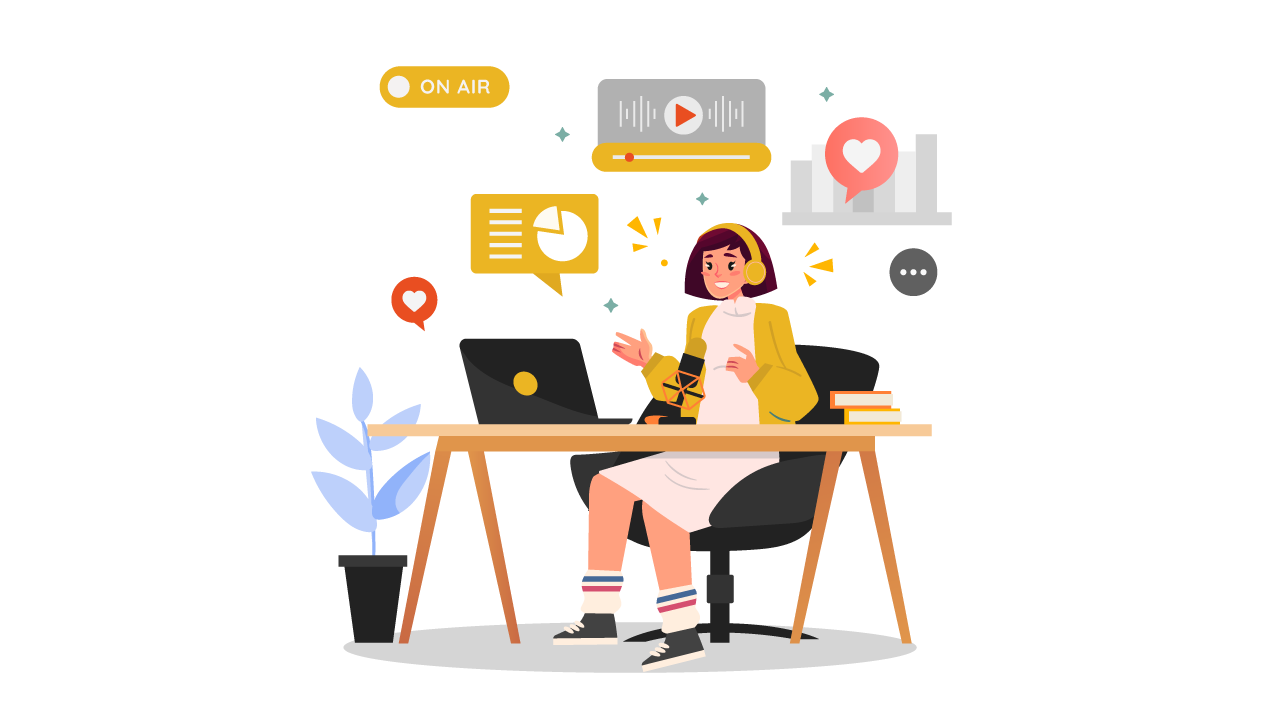
Ah, yes – here’s a perfect example of self-doubt rearing its ugly head to stand in the way of you and your aspirations. A common question that often pops up in the minds of most beginner podcasters is, “Can just anyone start a podcast?”
The truth is that anyone can start a podcast! Sure, it might be easier or harder for you depending on your skill level – but podcasting as an opportunity is wide open for anyone to explore.
Most people doubt their ability to attract and connect with listeners because they feel they don’t have enough experience. Again, some experience obviously comes in handy when talking to an audience. But the beauty of podcasting is that you can grow into a successful authority in your niche – even if you barely had an audience when starting out.
Podcasting is a skill that you can develop, hone, and master with practice. There are lots of wonderful resources (such as the one you’re looking at right now) that can help you make your mark in the industry.
Myth #2 – Podcasting for Business is Oversaturated, You Missed the Wave.
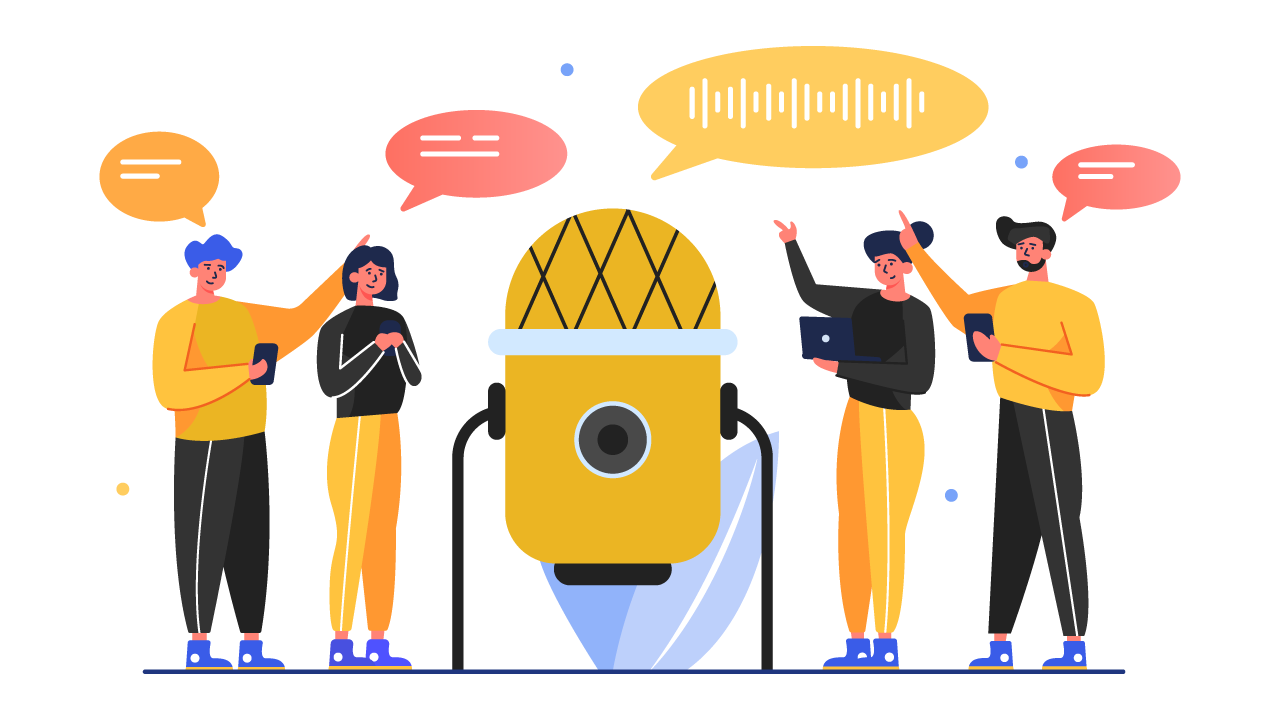
If you’re wondering if the podcast market is oversaturated, you’ll be relieved to know that it’s far from it.
With the popularity of podcasting skyrocketing and streaming services scarfing the podcast networks that are popping up everywhere, it’s easy to see why businesses might be concerned that they missed the gold rush.
But while it might seem that every brand is dabbling in the idea of launching its own podcast show, data shows that the industry is far from reaching its peak.
As highlighted in our previous post in this series, podcasting is a growing media. According to statistics by The Infinite Dial 2021 by Edison Research, around 78% of Americans know about podcasting – up from 22% in 2006. Along the same lines, podcast Ad spending has seen tremendous growth from $169 million in 2016 to $1.33 billion in 2021 – and it’s expected to hit $2.74 billion by 2025.
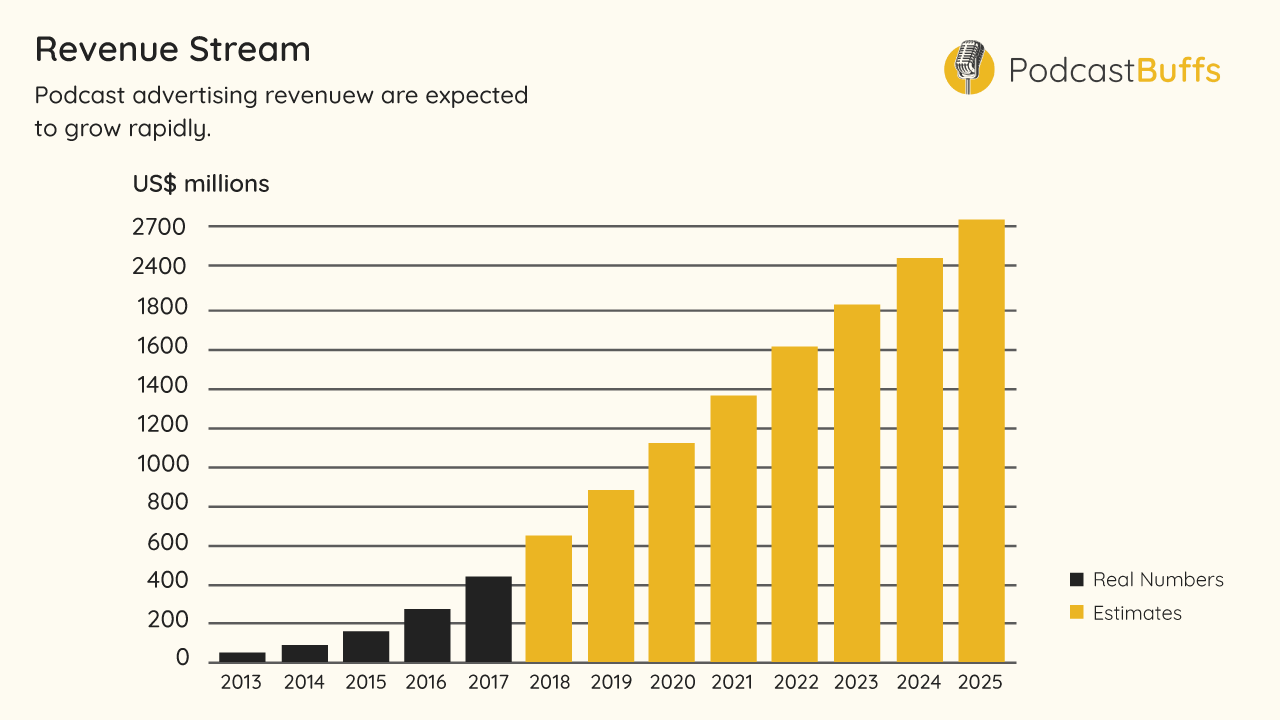
The above data tells of one story; that podcasting as a platform is far from its saturation point. More and more people are turning to podcasts every day to listen to shows. This means that you’re target audiences and clients are likely already podcast listeners – and the pool will only increase as the popularity of podcasting continues to skyrocket.
And if you still have doubts, take a look at blogging for comparison. There are currently more than 500 million blogs, and people continue to open more each day. Compare this to the estimated 2 million podcasts as of 2021, and it’s easy to see why taking the plunge and starting your business podcast now is a great idea.
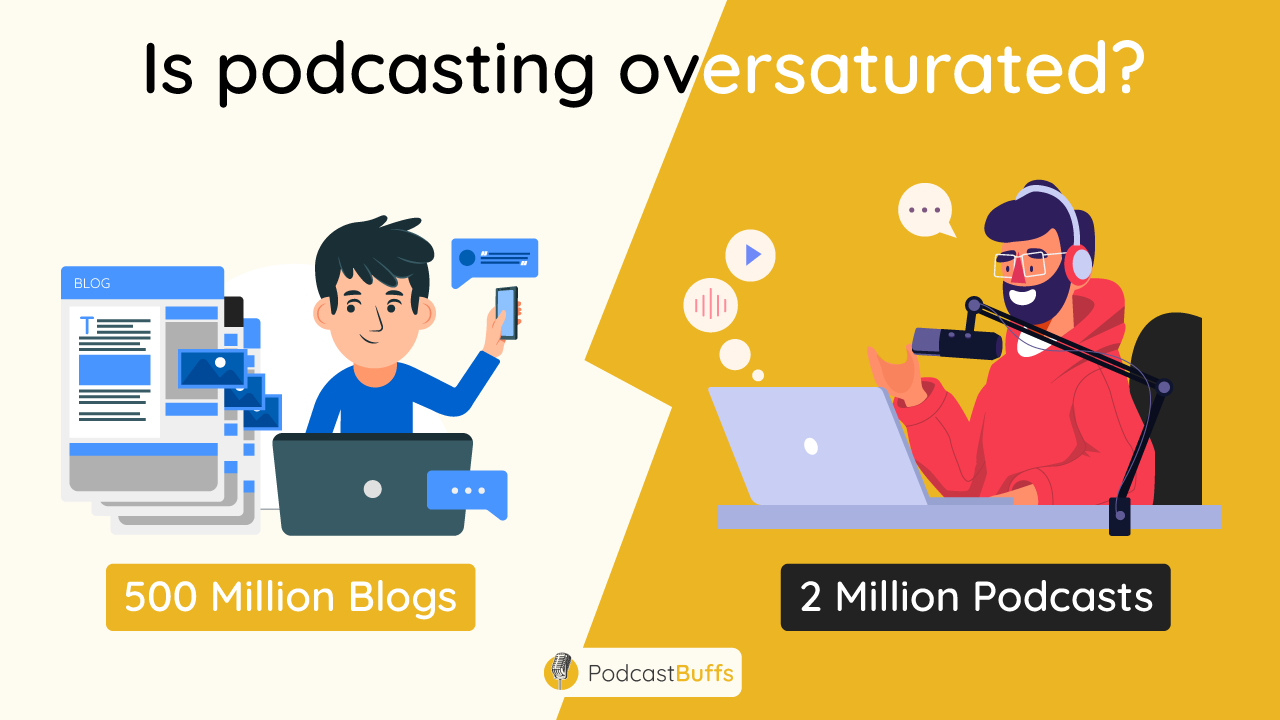
Takeaway: There’s so much more growth to come in the podcasting market – and the sooner you claim your piece of the pie, the better.
Myth #3 – You Need a Lot of Fancy Equipment.
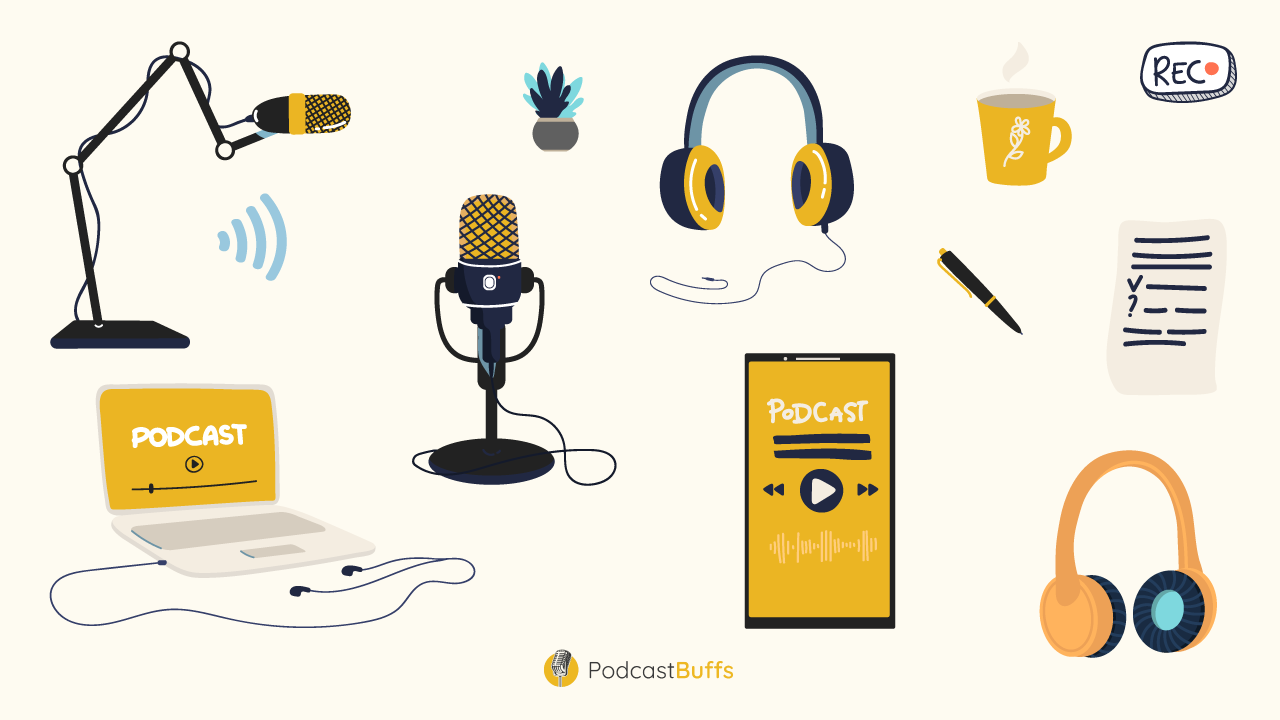
When you’re starting out, you don’t really need elaborate equipment. A minimal setup of essential things such as a computer, a quiet/insulated spot, decent headphones, and a microphone will do the trick.
While it’s true that some podcasters spend a small fortune bringing together a podcast studio, this should not dissuade you in any way. Don’t get us wrong, an arsenal of state-of-the-art equipment is great for producing high-quality shows. But you can still host great-sounding shows with entry-level equipment and quality content that resonates with your target audience.
You can run a quick search of “podcast equipment for beginners” or “podcast equipment list” to get an idea of what you need. But to nudge you in the right direction, here’s an infographic summarizing the necessities:
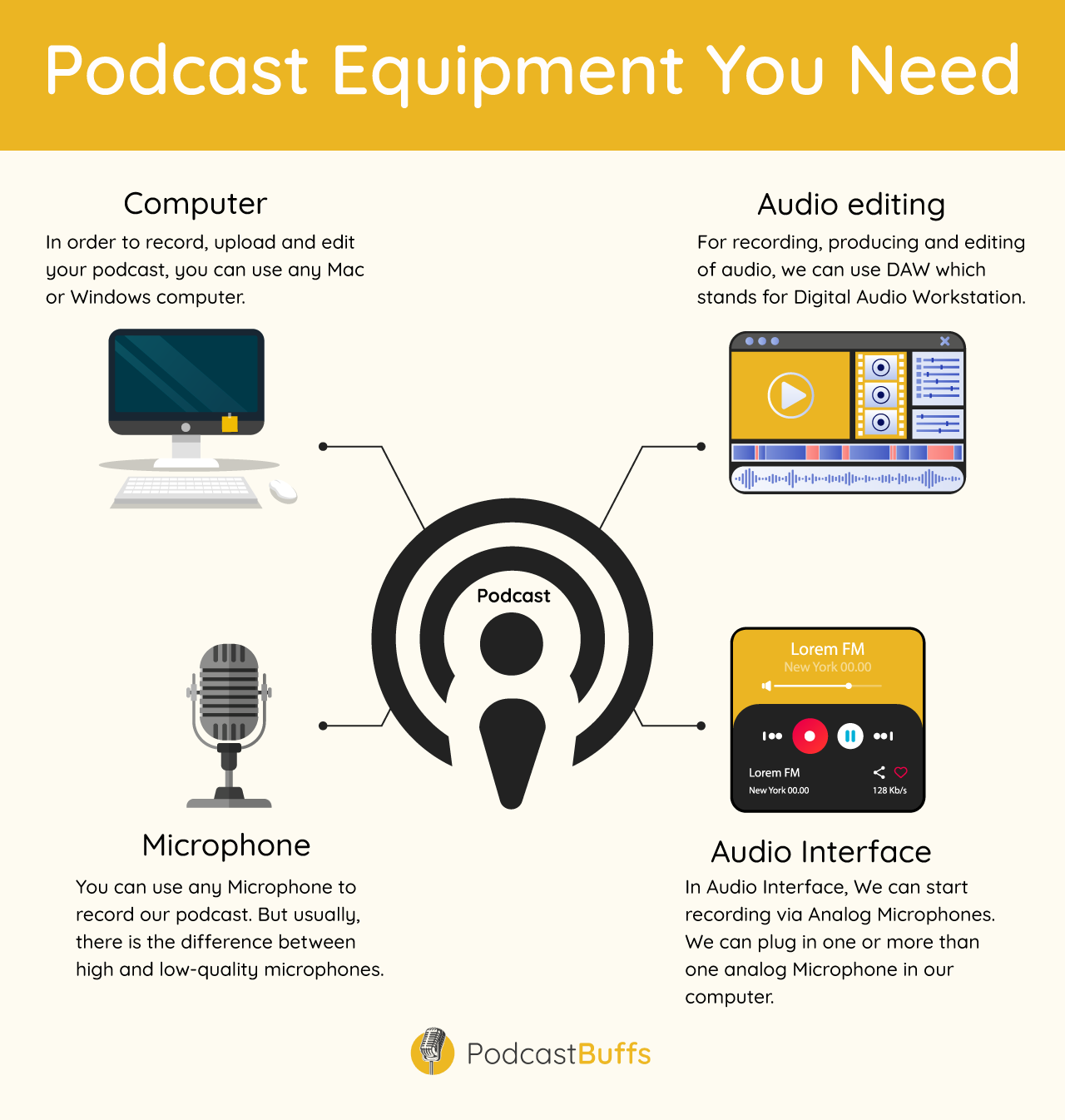
Takeaway: Fancy equipment are lovely, but it’s not a necessity. You can start small and upgrade gradually to your convenience.
Myth #4 – You Don’t Need a Niche or Topic of Focus.
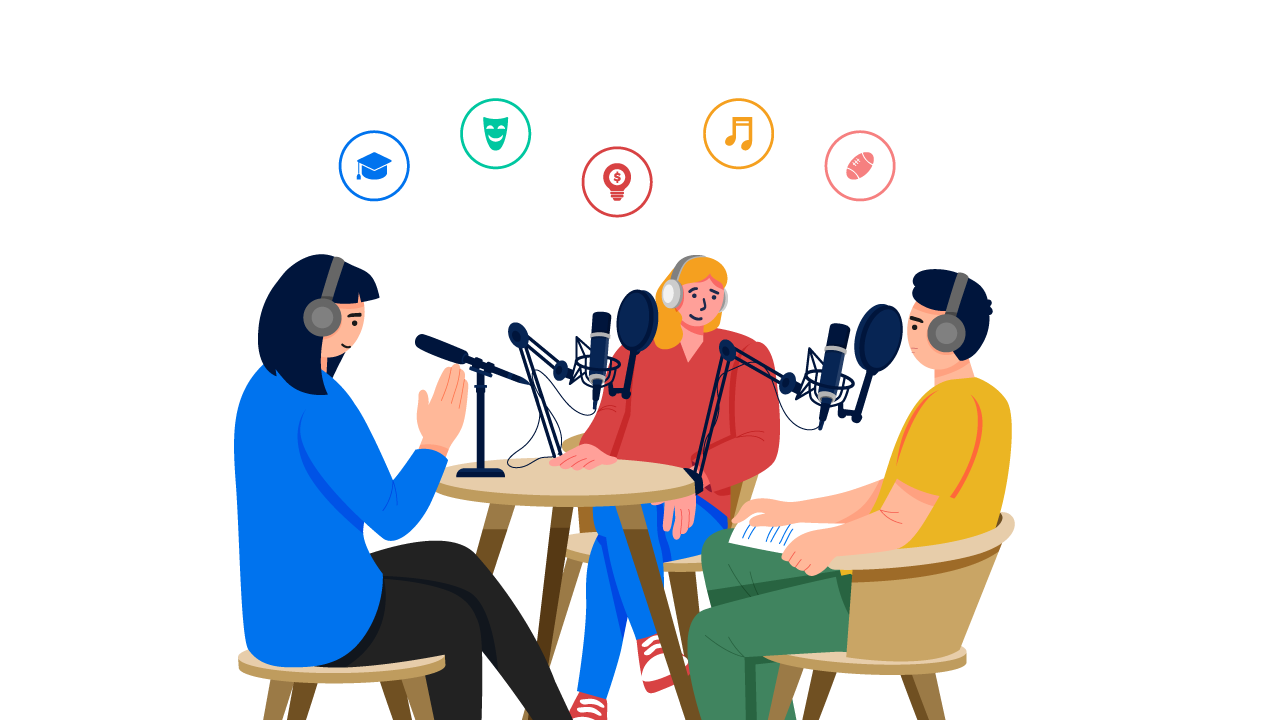
Should a podcast have a niche? Yes, it should!
The notion that you can just talk about anything that interests you is nothing more than a myth – a long, long shot at best. Just as with blogging or vlogging, you need to focus on a niche when creating a podcast.
Regardless of how much you love your freedom, failure to have a clearly defined niche or topic of focus might prove to be a huge blunder. Having a broad topic or an undefined niche makes your show seem like a tiny drop in a sea of podcasts.
“You can’t be everything to everyone, but you can be something to someone.”
Finding a niche gives you the opportunity to let your unique voice be heard in a segment carved out just for you – setting you on a path of success riding on a loyal audience base. But how do you find the perfect podcast niche for your show?
First, figure out what you want to talk about; this can be something that piques your interest, or you’re knowledgeable on. Then hone in on your niche by surveying the potential audience to understand what they want in order to match your content to their needs.
Takeaway: Put some effort and research into narrowing your topic of focus and locking down your niche for better odds of success.
Myth #5 – You Don’t Need a Quality Recording as Long as Your Content has Quality.
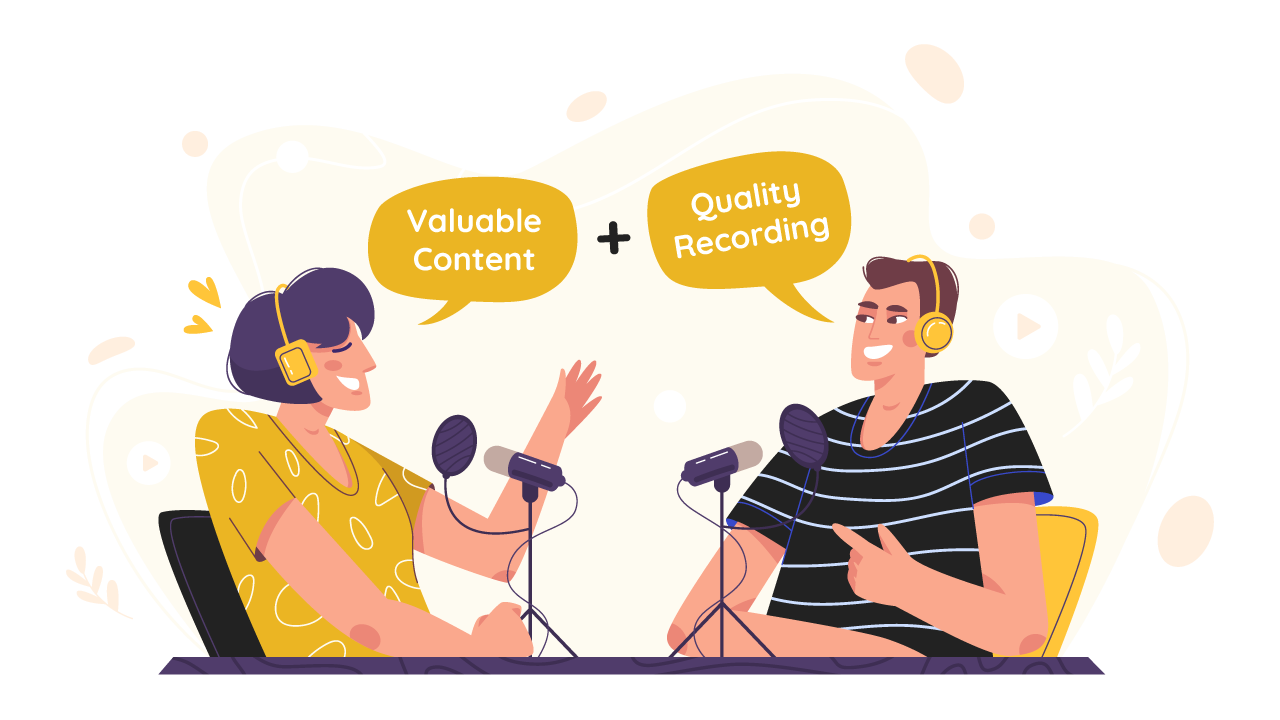
“Content is king, but distribution is queen. And she wears the pants.”
Content may be king, but it’s only one-half of the equation. Creating mind-blowing and succinct content that offers actual value or meets the needs of your target audience is non-negotiable if you want your show to succeed. But so is getting this ‘valuable content’ to listeners in a clear and well-edited format.
As mentioned in the debunked podcast myth #1, any company with a burning desire can start a podcast show successfully. But this also demands a little bit of work and effort – key among them is a great recording delivered expertly. Even the best content may turn off listeners if they’re having a hard time making out the message you’re trying to put across.
So, get a good microphone for clear RAW audio and find a way to polish/balance it by ironing out dead audio, lengthy pauses, coughs, unbalanced loudness, audio levels, and other kinks.
Takeaway: Always create quality content and deliver this in an equally high-quality recording.
Myth #6 – You Need a Radio Voice to Host a Podcast.
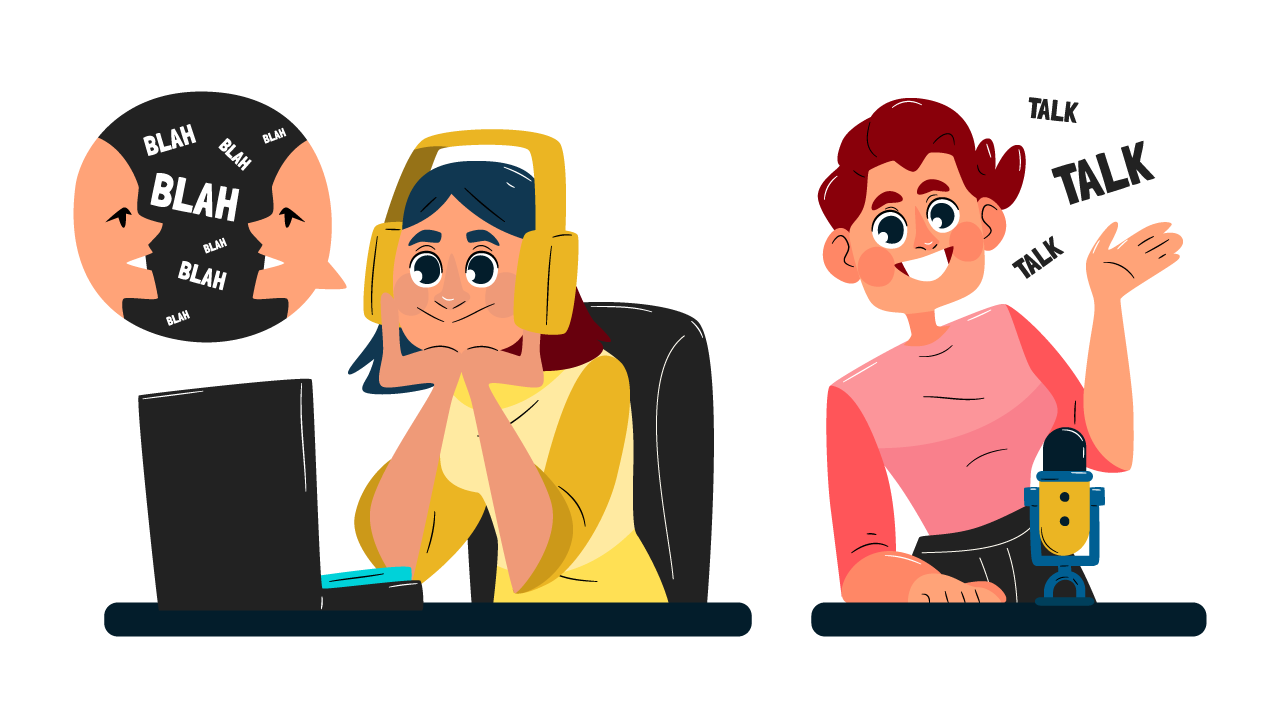
Are you concerned that your voice doesn’t sound good enough on a recording? Well, get in line; the ugly truth is that lots of people find the sound of their voices a bit unnerving or even off-putting – and there’s a science-y explanation for this fairly common phenomenon, known as Voice Confrontation.
As covered by The Washington Post, your perception of your voice is based on sound vibration transferred to our ears externally via air conduction—and sound vibrations transferred internally by our bones, which are better at carrying rich/low tones than the air. So when you hear your voice on a recording without the body vibes, you might cringe a little – but this shouldn’t be a concern.
According to an article appearing in The Guardian:
“It is unlikely that others are similarly surprised by a high-pitched aspect of your voice, and moreover, others probably aren’t making the same evaluations about your voice that you might. We tend not to be critical of other people’s voices, so the chances are you’re the only person thinking about your own.”
Besides, your unique voice can work in your favor by helping you stand out from the crowd, giving you a competitive advantage. If you think about it, most podcast hosts have drastically different sounding voices. Your voice is exactly what your podcast needs – as long as you have a desire to connect with listeners, a passion for the topic, and you deliver quality/valuable content.
Takeaway: You don’t need a ‘radio voice’ to host a show. Your voice is unique. Even though hearing your own voice may be unnerving, this is not a reason to suggest that it doesn’t belong on air.
Myth #7 – Podcasting for Business is Time-Consuming.
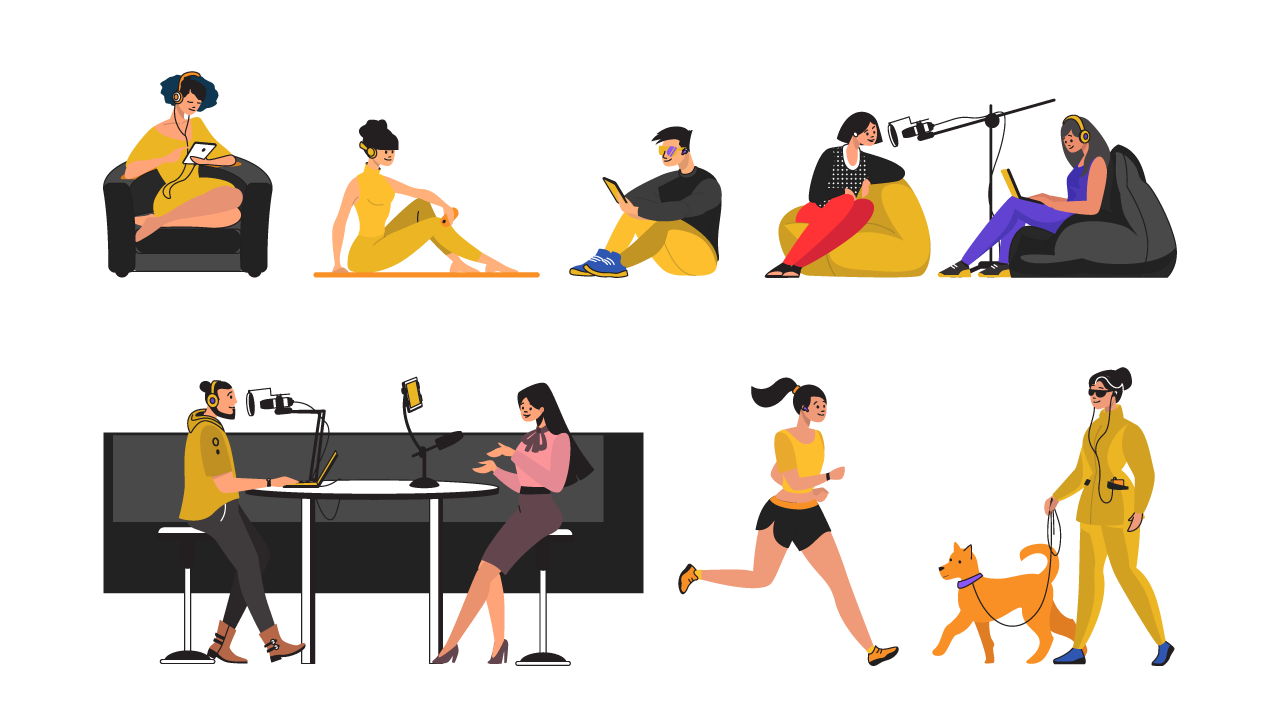
Time is our most valuable resource – and the only currency we can’t earn any more of or get back. So it makes sense that most aspiring podcasters might be concerned about how much time it takes to make a podcast.
Most people second-guess their desire to make a B2B podcast because they’re worried the venture might take more time and energy than they have (or are willing to expend) – which is a valid apprehension.
In all honesty, making a business podcast is not a walk in the park. You have to take care of a couple of variables, including organizing everything, planning the details of each episode, setting up the equipment, editing (where a lot of the time goes), publishing, and promoting the podcast episodes.
But whether or not this gobbles up chunks of your time comes down to how you manage the process. The beauty of podcasting is that it can be molded to fit into your schedule.
So, how much time does it take to make a podcast? The more accurate question is; how much time do you have? The time it takes to create and have an episode in the listeners’ ears depends on the individual. It can take longer or shorter depending on the length of the episodes, the type of content, and the style of the podcast.
The easiest and arguably the most effective way to consistently churn out quality content and save valuable time in the process is by handing over the editing reigns to a podcast editing company.
Takeaway: This is a tricky myth to burst because it has some truth in it, but there are workarounds.
Myth #8 – Podcasts Have a Discoverability Problem.

Podcast discoverability is a hotly debated topic in the industry. Whether or not podcasting has a discoverability problem depends on who you ask and the angle you look at it from. So why then does it appear here as a podcasting myth?
Back in 2017, Jacobs Media—a market research and consulting firm—asked some leading voices in the podcasting space for their take on the question, “Do Podcasts Have a Discoverability Problem?” Here are some responses:
- “Discoverability is not the problem. You can discover podcasts on any subject you want. Go to any podcast app, type a subject in the search, and press enter. Boom! Discovery solved. There is also Google. Type the subject you are looking for and add the word “podcast,” and you will get results. The people that say there is a discoverability problem are saying that because their show is not coming up in the search results. My guess is they have an ‘If I record it, they will come’ mentality.” – Dave Jackson, Podcast Consultant, Speaker, Author.
- “Like any new medium, discoverability is always a challenge. In the early days of television, TV shows had a huge discoverability problem because the only people who could discover a show were people with TV sets. With podcasting, the problem is similar. While most people have the technology to listen to a podcast, we know the majority of people still don’t know how to use it or care enough to want to learn how to listen to a podcast.” – Mike Carruthers, Host at Something You Should Know.
- “While podcasters think they have a discovery problem, “podcast discovery” is actually a mythical problem because it doesn’t affect the consumers. As with all other forms of marketing, there isn’t a Field of Dreams ‘If you build it, he will come’ solution.” – Daniel J. Lewis, Speaker, Consultant, and Host.
- “If you’re a podcast listener… podcasts don’t have a discoverability problem. The podcast community does a great job of telling other podcast listeners what is new and what is the next big thing in podcast listening.” – Chris Peterson, Senior Vice President, Podcasting at iHeartRadio.
- “Podcasts don’t have a discoverability problem. I don’t believe there are hordes of people out there who are actively looking for podcasts but are being thwarted by poor discovery. Google works just fine for that, last I checked.” – Tom Webster, VP of Strategy and Marketing at Edison Media Research.
- “No, they don’t. In my experience, most avid podcast consumers have more podcasts on their download list than they have time to listen to them. The truth is that the only podcasts that have discoverability problems are the ones that are failing to inspire their audience members to recommend their episodes to friends.” – Jennifer Briney, Executive Producer & Host at Congressional Dish podcast.
- “In some ways, podcasts have a discoverability problem. It seems many listeners discover shows through word of mouth. Larger shows, of course, can advertise and use other paid media to get the word out.” – Donna Papacosta, Principal, Trafalgar Communications.
Based on these responses, it appears that the problem with podcast discoverability is more about a failure to promote your podcast show in the right places and in the right ways. If podcast listeners want to listen to a podcast on a certain topic, there are enough avenues to do so; you just have to make sure you’re one of the search results that come up.
So, how do you increase discoverability on a podcast? Focus on your audience, create worthwhile content, expertly edit your recording, make use of show notes, build your online brand, and publish regularly.
Takeaway: Whether podcast discoverability is a problem or not, you must do all you can to be discoverable and worth discovering.
Myth #9 – You Must Know Influential Guests.
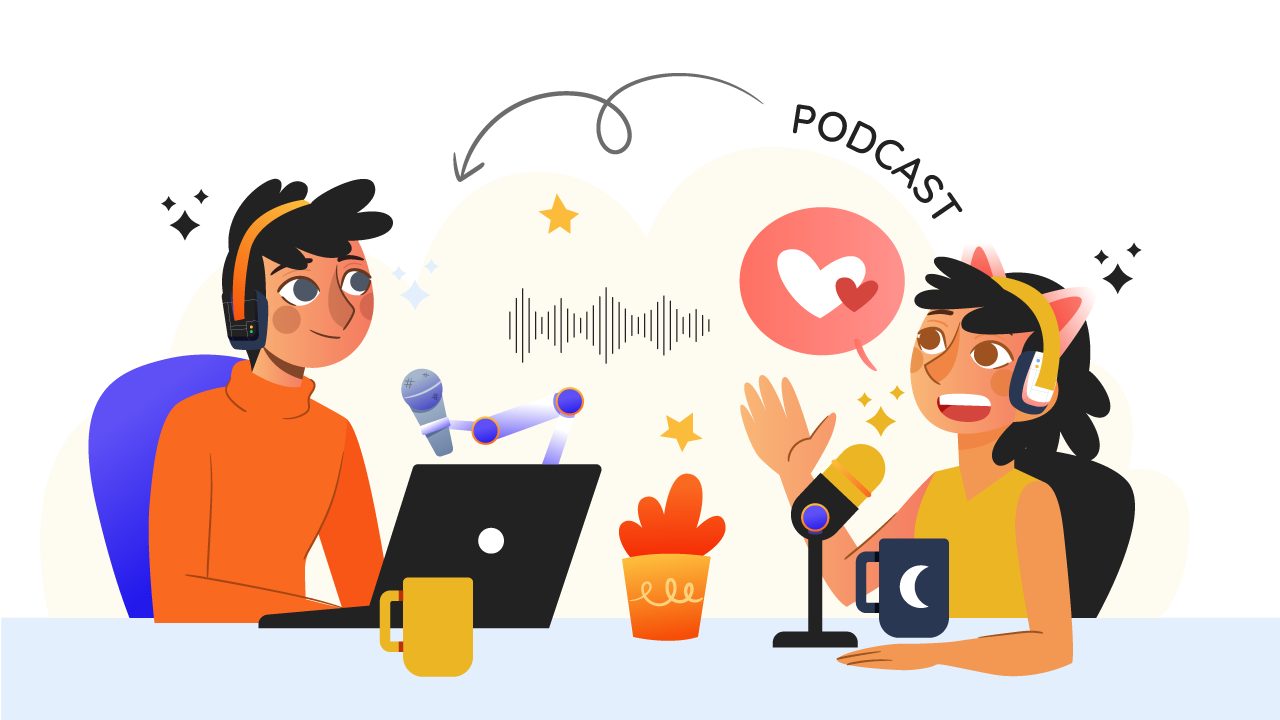
As a new business podcaster with little-to-no credibility or connections in the industry, you might feel you don’t know a worthy guest to feature on your show – and this is understandable. But you have to realize that people have a penchant for talking about themselves.
Everyone has a story to share or something to promote, and giving them a platform to do so works in both of your favors. Besides, you have to start somewhere. Simply create great content and reach out to ideal guests.
Truth be told, they might not all take you up on your invitation, but odds are that a couple will agree to appear on your B2B podcast show. And when they do, you can leverage those names to build momentum and get more expert guests.
Takeaway: Start where you are, reach out to guests who are experts in your topic or niche, and keep going.
Myth # 10 – You Don’t Need to Edit Your Podcast.
This right here is a blatant podcasting myth – but a common challenge among beginner and even veteran podcasters!
Podcast listeners are a picky bunch and relatively good at separating the wheat from the chaff – especially with the industry enjoying a period of increasing popularity, meaning more options for listeners. ‘Muddying’ your episodes with unrelated digressions or endless “ums” and “ahs” may cost you your listeners.
Your primary goal as a podcast host should always be ensuring your listeners get valuable content in the best possible quality. And since it’s extremely hard to record a podcast perfectly without the occasional faff, fluff or stuff-ups, editing is necessary.
If podcast editing is intimidating, you don’t have the time, or you want your episode to be delivered in the highest quality, consider hiring a podcast editing service – and let the professionals do the heavy lifting for you as you focus on creating great content for your audience.
Takeaway: Podcast editing is an essential part of creating a successful podcast. You have to invest your time and effort to master the skills needed or find a podcast editing service to help.
What’s Stopping You Now?
Want to start a podcast? Go for it!
We’ve just busted some of the most common podcasting myths wide open. If you’re looking to get into the podcasting for business game, take the plunge already. Don’t let a bunch of urban legends, half-truths, and whole lies hold you back from taking your brand to the next level.
Now that we’ve set the record straight, the ball is in your court; take it, run with it, and don’t look back.
Don’t know where to begin? Get started with our free B2B Podcasting course.
FREE EMAIL COURSE
B2B Podcasting Mastered
Learn how to launch a revenue generating podcast for your business in just 10 minutes a day, for 2 weeks.

